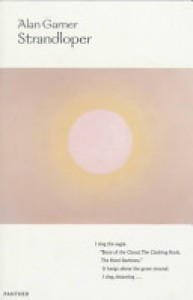Currently reading
A Creature of Moonlight
Saffron And Brimstone: Strange Stories
Captain Vorpatril's Alliance
Snow in May: Stories
Strandloper
 A short novel very loosely based on the experiences of William Buckley, a British man transported to Australia who lived among the Aborigines there.
A short novel very loosely based on the experiences of William Buckley, a British man transported to Australia who lived among the Aborigines there. It's an impressive piece of literature; but the ways in which Garner's tale differs from the historical events is very illuminating of Garner's concerns.
One of the main themes of the book is drawing a parallel between the 'primitive' rituals and beliefs of the Aborigines and those of rural Britain - this is done masterfully. It's the sort of goal that, described briefly, sounds doubtful - but Garner describes individuals whose ignorance, from a modern perspective, is shocking - but does so in a way that gives a sense of a deep and abiding respect for human dignity.
(This theme of rural ignorance tempered with an ancient dignity is also found in Garner's novel, Thursbitch.)
Does it reflect reality? That's another question. Garner is deeply interested in linguistics and the power of language. In his tale, Buckley's 'crime' is accepting lessons in reading and writing from a local aristocrat's son. (In truth, he was accused of receiving stolen goods, and was illiterate throughout his long life.)
Garner is also a folklorist, specializing in the traditions of the British Isles. The English village that he describes is suffused with 'pagan' rituals, coexisting with Christianity. The rhymes and language of these traditions, as well as the dialect of the villagers, is vivid - the reader can practically hear the songs and the speech of the people. This depiction's convincingness depends on showing a remote, isolated population. Buckley is described as never having been 10 miles from the place of his birth. History records that, on the contrary, he'd been in the army, fought in the Netherlands, and was arrested in London.
This is not to say that I appreciate any less a story which is in large part about the magic of words. But Garner's 'wise fools' are, in a way, as mythical as the folkloric legends he studies.
The bittersweet romance of the story, with Buckley being sustained by the token his sweetheart gave him, and his dream of returning home to his true love, is heartbreakingly effective. The truth, of course, is that Buckley never returned to England (nor was he ever so naive as to think that he would walk home through China). But it makes a good tale; and rings true, in the way that folk tales can often be more true than history.






